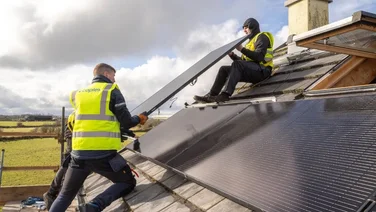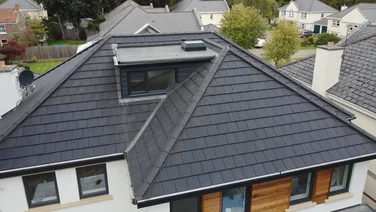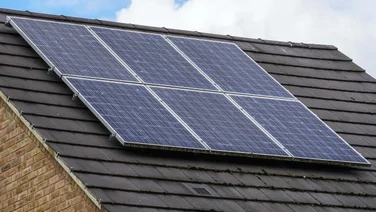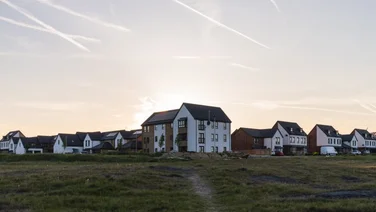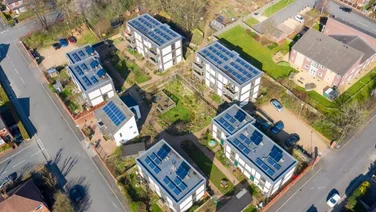- Solar panels could increase your home’s value by up to 14%
- 69% of Brits would buy or rent a property with solar panels
- Solar panels can improve a property’s EPC score, making it more desirable
Solar power cuts your energy bills, helps the climate, and stops you from being completely reliant on the National Grid – plus the cost of solar panels is falling – but will they add to your home’s value?
Research suggest they won’t affect your ability to sell your property, and could actually help you sell it.
We’ll get into the specifics how much value solar panels could add to your home, and why they’re popular in this article.
If you’re still worried about solar panels affecting the value of your home, talk to your mortgage advisor.
Assuming they tell you everything’s fine, you can fill in this form to get free solar panel quotes from specialists in your area.
Where do you want to install solar panels?
Get started
“Solar panels can have a really positive effect on the value of your home as they are beneficial to any new buyer’s costs and carbon footprint.”
– Maximilian Schwerdtfeger, Content Manager, The Eco Experts
Do solar panels increase the value of your property?
Study | Year | Property price increase from solar panels |
|---|---|---|
Solar Energy UK | 2021 | 0.9-2% |
BOXT | 2023 | 14% |
EffectiveHome.co.uk | 2020 | 14% |
Multiple studies have confirmed that solar panels add a substantial amount to your home’s value – though properties in certain locations benefit much more than others.
A recent study by home improvement experts BOXT found that solar panels could increase the value of a home by 14%.
The value that solar panels added to a property was on the lower end for the Southwest of England, but on the higher for the Midlands.
A 2021 study by real estate company Solar Energy UK also showed that solar panels can increase a property’s value. It found that solar panels raise a home’s value by 0.9- 2%, on average.
Naturally, homes in sunnier areas will benefit more from solar panels, so it’ll be easier to persuade buyers to meet a higher price.
That was clear from a study from EffectiveHome.co.uk which found that solar panels add 14% to the value of a home.
Another recent study from 2019 found that, on average, solar PV boosts home values by 14% – and that figure rises to 38% in some parts of England.
So, depending on where you’re located, solar panels could lead to an extra £90,000 onto your property value.
Plus, according to Greenlancer, not only do homes with solar panels generally sell for more money, but they have historically sold faster than homes without panels.
Examples of solar panels’ impact on UK property prices
Check out how much value could be added to your property below:

The industry view
While solar panels don’t necessarily increase the value of a home, the right buyer can change everything.
“Solar panels definitely make a home more attractive to prospective buyers who are environmentally conscious and keen to cut their carbon footprint,” explained Maximilian Schwerdtfeger, Content Manager at The Eco Experts.
It’s important to remember that some solar panels are leased, which means when you buy the house, you also buy the remainder of the lease – so some people might not be keen to take that on.
In situations like this, the solar installer buys the space above the property and leases it back to the homeowner. In return, the company generally installs the array for free.
If you buy your panels outright, things can be a bit easier. All in all, if you’re looking to sell your house, you might as well leave any solar panels on as it is expensive to remove them.
Public opinion on solar panels
You’ve probably heard the long-standing debate over whether panels actually look nice on a property – and you might even have your own opinion on the matter.
To get a better understanding of how people feel about solar panels’ appearance, we’ve carried out a survey, asking 2,134 British adults how attractive likely they are to buy or rent a property with solar panels.
To get a better idea of this relationship, check out the results in the chart below. Respondents were given the option state their likelihood of buying or renting a property with solar panels on a scale from “very unlikely” to “very likely”.

Interestingly, there was a clear correlation in our survey between the age of the respondents and how likely they were to buy a property with solar panels.
74% of Millenials and Gen Z said they were “likely” or “very likely” to buy or rent a property with solar panels, compared to 65% of Boomers and 61% of the Silent Generation.
Despite the mixed responses, 69% of respondents said they would buy a house if it had solar panels on the roof, up from 65% in last year’s National Home Energy Survey.
With any luck, these figures will continue to grow. As the solar industry evolves, experts are coming up with new ways to improve the look of solar panels. Many newer panels are a uniform black with black frame (older ones often had a silver frame) so blend in better to most roofs.
Another simple way to improve the appearance of a roof is to look into integrated panels – these sleek sheets sit snuggly in between tiles, rather than looking bulky, sitting on top of the slates.
Where do you want to install solar panels?
Get started
Why do solar panels increase property value?
There are a few reasons behind this increase in property value, but it mainly boils down to how much solar power can save homeowners on energy bills. Solar panel owners can also sell surplus generation back to the grid through the Smart Export Guarantee (SEG) – bringing in even more money.
In fact, we worked out that if you have a three-bedroom house, you’ll save £454 per year on your energy bills from solar panels, and make £159 from the SEG – totting up to an annual saving of £641 a year.
Not to mention that buying a home with panels already attached can help homeowners avoid the upfront installation costs.
Solar-equipped homes also tend to sell for more because solar panels are considered to be upgrades to the home – similar to how an extension or conservatory increases a home’s value.
Solar panels can also increase a property’s Energy Performance Certificate (EPC) score – which is a measure of it’s energy efficiency – by over two levels. This is hugely desirable for buyers, especially since the government is pushing for all houses to be rated ‘B’ by 2030.
The Department of Energy and Climate Change (DECC) analysed over 320,000 properties between 1995 and 2011, and found that when a home’s EPC rating rose from band G to E – or from D to B – its property price also rose significantly.
You could benefit from this kind of shift.
Other factors to consider
There are a few factors to consider when determining how much value solar panels could add to your home. These include geographic location, solar installation prices, your system output, and the age of your solar panels.
We’ll go into more detail about each factor in the following sections.
Geographic location
When it comes to energy prices, each region is different. This is because each area’s local distributor has its own charges set for suppliers – and energy providers then pass these additional costs onto customers through their energy bills.
If a property with solar panels is in an area where energy prices are particularly high, it will become much more valuable. This is predicted to become more commonplace as energy prices surge across the UK.
Location can also influence the amount of sun exposure panels get, which has its obvious benefits for solar energy – the more sunlight you have, the more energy can be generated. This is one of the key reasons why Cornwall is the solar hotspot in the UK.
Local solar installation prices
This overlaps with our previous point, but depending on how much local installation prices are in the area, a property with pre-installed panels could be like gold dust.
If it’s a pricey area compared to other parts of the UK, buyers will be able to save roughly £5,000 by investing in a home with a system already installed.
Age of the panels
If your system has seen better days – whether that’s due to wear and tear or just old age – it probably won’t add much value to your property.
Bear in mind that solar panels generally last for roughly 25-30 years before their efficiency starts to decline. If your panels are reaching their twilight years, there’s a chance the buyer will need to carry out repairs or replace worn-out parts fairly soon. It might even end up costing the same as getting a new system.
Pros and cons of selling a home with solar panels
- They increase your home’s value by as much as 14%
- It's easier to sell a home with ready-made energy savings of up to 70% per year
- Solar panels save 1.6 tonnes of CO2 per year, and 74% of adults are concerned about climate change
- Solar panels' popularity makes convincing people to buy easier – there are a million UK solar homes now
- 69% of people would buy a home with solar panels
- Solar is the most popular energy source
- Some people don't like the look of solar panels
- You won't benefit from free solar energy once you sell your house
Summary
Solar panels will add value onto your home, according to multiple studies – and it just makes sense.
After all, the worst part of buying anything which’ll make your life better is paying for it. If you can buy a property that already has a gorgeous, functioning solar array, it removes the only significant obstacle.
You can charge more, and your buyer can just lie back in the sunshine and watch the savings roll in. It’s a win-win.
If making your home more valuable sounds good to you, the next step is to fill in this form to receive free quotes from solar specialists in your area.
FAQs
What happens to the SEG if I sell my house?
If you sell your house along with your solar panels, then you will no longer have ownership of them. This means that any payments generated from exporting electricity back to the grid will be passed on to the new owners of the solar panels.
Can you take your solar panel system with you when you move?
Yes, it’s possible to take your solar panel system with you when you move house. However, this process can be complicated and costly.
This is partly because installers tailor solar panel systems to the size, roof-dimensions, and energy needs of a property, so your new property might not be a right fit for your old system.
What happens to solar panels after 25 years?
25 years is the average lifespan of most solar panels. This doesn’t mean that solar panels stop working after that time, and they don’t necessarily need to be replaced. A solar panel’s lifespan just means that it starts to produce slightly less energy each year after the 25 year mark.


